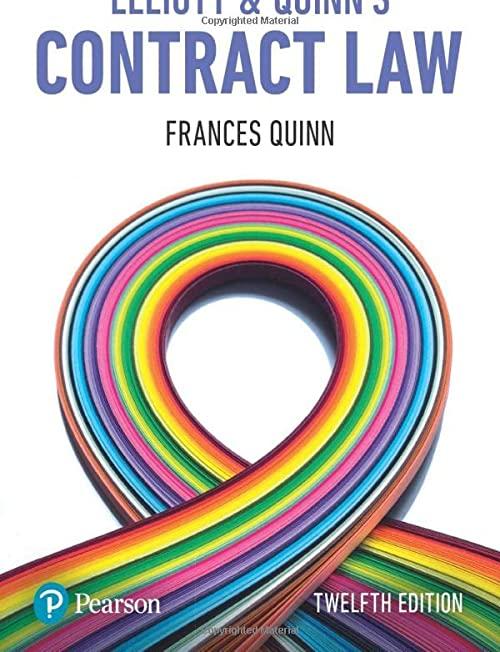Question
Answer All The Questions 1. Every promise and every set of promise forming the consideration for each other is a/an __________. a) agreement. b) offer.
Answer All The Questions
1. Every promise and every set of promise forming the consideration for each other is a/an __________.
a) agreement.
b) offer.
c) contract.
d) acceptance.
2. __________ is made by words spoken.
a) Implied contract
b) Express contract
c) Tacit contract
d) Unlawful contract
3. __________ company needs to have only two directors.
a) Public Company
b) Sole Proprietorship
c) Private Company
d) None of the above
4. Voidable contract is one __________.
a) which is valid as long as it is not avoided by the party entitled to do so.
b) which is lawful.
c) which is unlawful.
d) which is invalid.
5. A prospectus is issued by __________.
a) Departmental undertaking
b) Private company
c) Statutory Corporation
d) Public company
6. When the contract is perfectly valid but cannot be enforced because of certain technical defects. This is called __________.
a) bilateral contract.
b) void contract.
c) unilateral contract.
d) unenforceable contract.
7. __________ is forbidden by law.
a) Illegal agreement
b) Voidable contract
c) Unenforceable contract
d) Valid contract
8. A owns a residential flat. He is entitled to a quiet possession and enjoyment of his property. This is called __________.
a) rights in personal.
b) there is no right at all.
c) moral right.
d) rights in rem.
9. A partner whose association with the firm is unknown to the general public is called __________.
a) Sleeping partner
b) Nominal partner
c) Active partner
d) Secret partner
10. A has bought a house for RM150,000.00. Which of the following right is available to A after the purchase?
a) He has a right against the whole world to have a quiet possession of the house and enjoy in it.
b) He has a right to live in the house but cannot sell.
c) He has a moral right over the house.
d) He has a right against the seller to have a quiet possession of the house and enjoy in it.
11. A invites B for coffee in Coffee Day Restaurant and B accepts the invitation. On the appointed date, B goes there but A is does not come. In this case __________.
a) B has no remedy against A.
b) B has to wait for another invitation from A.
c) B can sue A for not honouring his words.
d) A has to invite B again, to keep the promise.
12. A promises to deliver his watch to B and, in return, B promises to pay a sum of RM2000. This is a/an __________.
a) offer.
b) agreement.
c) proposal.
d) acceptance.
13. A and B enter into a contract to marry each other. Before the time fixed for the marriage, A goes mad. The contract becomes __________.
a) voidable.
b) valid.
c) void.
d) illegal.
14. An act done by a company beyond its constitutional power is __________.
a) Part of Indoor management
b) The act of a separate legal entity
c) Ultra vires
d) Intra vires
15. An agreement is valid __________.
a) which is written on a piece of paper and signed by the parties.
b) which creates legally binding right and obligations of the parties to it.
c) which creates legal and social obligations of the parties.
d) which creates rights of a party.
16. Which of the following forms of business enterprises suffer from a lack of public confidence because they are not required to publish their accounts legally?
a) Partnership
b) Cooperative Society
c) None of the above
d) Company
17. If a member of a company falls below two (2), the remaining member must find a new member within __________.
a) A month.
b) Nine (9) months.
c) Six (6) weeks.
d) Six (6) months.
18. What do you mean by symbolic possession?
a) Delivery of keys of lock of godown where the goods are.
b) Actual Delivery.
c) Conditional promise to delivery.
d) None of these
19. Provision under __________ allows ratification on contract made before the incorporation of the company.
a) Section 130 Companies Act 1965
b) Section 35 (1) Companies Act 1965
c) Section 30 (1) Companies Act 1965
d) Section 351 Companies Act 1965
20. What does Caveat emptor means?
a) beware agent
b) beware trader
c) beware customer
d) beware seller
Step by Step Solution
There are 3 Steps involved in it
Step: 1

Get Instant Access to Expert-Tailored Solutions
See step-by-step solutions with expert insights and AI powered tools for academic success
Step: 2

Step: 3

Ace Your Homework with AI
Get the answers you need in no time with our AI-driven, step-by-step assistance
Get Started


